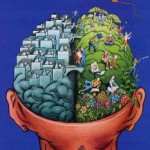Life sciences marketing: the two brains revisited
No doubt you — like millions of others — are an avid follower of my posts on this site. Cast your memory back about a year ago. In “Feeding the thing with two brains,” I blogged about the attraction to life sciences marketing, likening it to balancing the “needs” of the two sides of the brain — the rational and the emotional. Well, now I’m writing about another aspect of this field that continues to fascinate: the potential to learn something new — or unlearn a “fact” you have known forever.
Imagine my amazement when I viewed a presentation via TED of an RSA Animate talk given by noted psychiatrist, author and brain expert Iain McGilchrist. In this artfully animated talk, he disposes of the old paradigm I quoted in my previous post: “The right brain is the seat of all that is rationale, and the left brain is the seat of the emotions.”
Instead, we learn that reality is much more complex, with reason residing in both hemispheres of the brain, and imagination residing in both as well. This not to say the two sides of this wonderful organ are equal — or even equivalent. They are, in fact, not even symmetrical. What emerges is much more compelling version of how we engage our world, with the left brain focusing on the details of what we know, in order to get specific tasks done, and the right brain taking a distanced view, allowing us to connect with the world that might be. Both are important, as Dr. McGilchrist observes with a quote attributed to Albert Einstein: “The intuitive mind is a sacred gift and the rational mind is a faithful servant.”
How does this relate to life sciences marketing? It’s clear that we still need to “feed the thing with two brains” if we are to fulfill our potential. We need to appreciate both the “sharply focused attention to detail” to deal with the world of reality, and also use the “broad, open vigilant alertness” to place that detail within the larger context of the world of possibility. We must be conscientious in how we reconcile what Iain McGilchrist calls these “two versions of the world.”
In that earlier post, I described a life sciences company that is using its technology to both help researchers find better ways to develop new therapies, and at the same time help physicians choose the right therapies for their patients. Marketing such an offering to scientists, physicians and patients requires both the tightly focused mind and the broadly empathetic mind. I find that fascinating — and I will continue to try to keep both sides of my head in the game.
If you would like to see Iain McGilchrist’s talk in its entirety, you can see it here:





